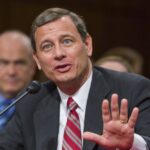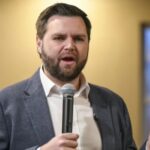



Former Washington governor and U.S. Senator Daniel J. Evans passed away on Friday at the age of 98. Evans, who was known for his pragmatic political approach and moderate stance, leaves behind a legacy of public service and a lasting impact on the state of Washington.
The New York Times reported that Evans was widely respected for his leadership and contributions to Washington, serving as governor for three terms and later as a U.S. Senator.
Born into a pioneer family, Evans grew up in Seattle’s Laurelhurst neighborhood, a place he called home for much of his life.
His early years were marked by a deep commitment to public service. He achieved the rank of Eagle Scout and served in the Navy during both World War II and the Korean War. His upbringing, coupled with his father’s influence as a civil engineer, shaped Evans’ career in both engineering and politics.
Evans attended the University of Washington, where he studied engineering. His work on the design of Seattle's Alaskan Way Viaduct in the early 1950s reflected his interest in practical solutions and long-term planning.
It was his father, Les Evans, King County Engineer for 13 years, who had a significant influence on his path, with Evans noting that he learned as much from him as from his university professors.
In 1956, Evans made his first foray into politics by running for the state House of Representatives. He won and began a political career that would make him one of Washington’s most prominent leaders. By 1964, he was elected governor of Washington, the start of a historic three-term tenure.
Evans' leadership as governor was marked by significant achievements. He was the driving force behind the creation of the first statewide Department of Ecology in the United States, making Washington a leader in environmental policy. His foresight in addressing ecological concerns set a precedent for future state and national policies.
In addition to environmental issues, Evans was a strong advocate for refugee resettlement. Following the end of the Vietnam War, Evans opened Washington’s doors to thousands of Vietnamese refugees, ensuring they had a place to rebuild their lives in the state. His humanitarian approach was a hallmark of his governance, drawing praise from both sides of the political aisle.
During his time as governor, Evans faced a variety of challenges, including civil rights protests, labor unrest, and the ongoing controversy surrounding the Vietnam War.
In August 1967, following a tense public meeting in Seattle’s Central Area, Evans took swift action, establishing a community office within 30 days to address local concerns. His practical approach to governance and willingness to listen to the public helped defuse potentially volatile situations.
Evans once recounted his experience during a public meeting where tensions were high, with one attendee making a mock gun gesture toward him. Yet, Evans stayed calm, listening to the concerns raised and ensuring that the state would take action to address the needs of the community. His ability to engage with his constituents, even in difficult situations, earned him widespread respect.
Evans’ influence extended beyond Washington state. He was chosen as the keynote speaker at the 1968 Republican National Convention and was even considered as a potential running mate for President Gerald Ford in 1976. Though Ford eventually selected Bob Dole, Evans later reflected that his more moderate approach might have helped in the election.
Despite his growing national profile, Evans remained focused on his work in Washington. He presided over EXPO '74 in Spokane, a major event that welcomed President Richard Nixon. Evans humorously recalled the moment Nixon mistakenly referred to him as “Governor Evidence” during the event, a lighthearted moment that left the press amused.
After serving as governor, Evans was appointed to the U.S. Senate in 1983. Though he chose not to run for re-election, his brief tenure in the Senate was characterized by his focus on fiscal responsibility, particularly his push for tax reform, including the introduction of a state income tax.
In his later years, Evans remained active in public life, publishing an autobiography in 2022. His sons, Dan Jr., Mark, and Bruce, noted that even in his final years, Evans never truly retired from public service. “He just kept signing up for stuff right until the end,” they remarked, emphasizing his enduring commitment to the people of Washington.
Daniel Evans’ legacy is enshrined in numerous landmarks in Washington, including the Public Affairs School at the University of Washington and the Daniel J. Evans Wilderness within Olympic National Park.
Reflecting on these honors, Evans once said, “When you see your name on something while you’re still alive — instead of a tombstone — that was pretty rewarding.”
Evans’ style of leadership, grounded in his engineering background and his practical approach to problem-solving, continues to inspire many in the state. As journalist Enrique Cerna put it, “He was just one of those people that... wanted to get things done. And that was really his legacy.”



